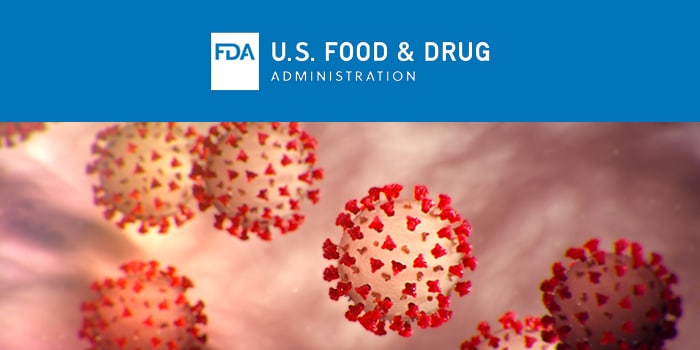FDA Issues COVID-19 Food Safety and Manufacturing Updates

In the past few days, the U.S. Food and Drug Administration (FDA) has released new information to answer coronavirus (COVID-19) concerns within the food industry, via official statements, a new FAQ page, and a stakeholder call addressing manufacturing, the food supply and worker safety.
During the call, Frank Yiannas, deputy commissioner of the Office of Food Policy and Response, assured listeners that “the U.S. food supply remains safe, there are no shortages [and] there is no evidence of food or food packaging being associated with the transmission of COVID-19.”
But to maintain safety, efficiency and reliability, the agency said it is adjusting some regulations and answering questions from the industry.
Food Safety, Manufacturing and COVID-19
According to the FDA, COVID-19 cannot be transmitted via the food supply.
“Unlike foodborne gastrointestinal (GI) viruses like norovirus and hepatitis A that often make people ill through contaminated food, SARS-CoV-2, which causes COVID-19, is a virus that causes respiratory illness,” the FAQ page explains. “Foodborne exposure to this virus is not known to be a route of transmission.”
Food manufacturers should follow protocols set by local and state health departments, which may vary depending on the amount of community spread, the FDA notes. Yiannas said it’s unlikely products would be recalled due to the virus.
“We do not anticipate that food products would need to be recalled or withdrawn from the market should a person who works in the food facility be confirmed for COVID-19,” he said.
If an employee is infected, Susan Mayne, director of the Center for Food Safety and Applied Nutrition (CFSAN), said during the call that companies should inform employees but maintain confidentiality. Afterward, all employees should continue following Centers for Disease Control and Prevention (CDC) guidance.
Mayne also noted food and agriculture are considered “critical sectors” by the Department of Homeland Security (DOHS). Thus the FDA and corresponding agencies will “do everything possible to make sure food and agriculture continues production and manufacturing without hindrance,” she said. She noted additional resources for food businesses include FEMA’s National Business Emergency Operations Center (and 24/7 email assistance at nbeoc@fema.dhs.gov) for supply chain issues, including navigating quarantined areas, and CSFAN’s industry and consumer page for food safety and technical questions.
Moving forward, the FDA is also updating protocols to prevent person-to-person contact between FDA employees and food industry workers.
Hold on Foreign and Domestic Inspections
On March 10, the FDA announced temporary reductions in foreign inspections, with commissioner Stephen Hahn noting most would be halted until April unless deemed “mission-critical.” In an announcement Wednesday, Hahn added that domestic inspections — normally conducted every few years — would similarly be postponed unless deemed “mission-critical,” helping protect FDA staff and prevent visitors in manufacturing facilities. Despite this, the FDA has “full confidence” in product quality and safety and will determine new ways to conduct inspections without the public safety risk, he noted.
“This can include, among other things, evaluating records in lieu of conducting an onsite inspection on an interim basis when travel is not permissible, when appropriate,” Hahn explained.
Hold on FSMA Supplier Inspections
Additionally on Tuesday, the FDA announced a temporary hold on Food Safety Modernization Act (FSMA) on-site supplier verification audits for receiving facilities and importers due to travel restrictions and advisories. Three regulations under FSMA, the Preventive Controls for Human Foods (PC Human Food) rule, Preventive Controls for Animal Food (PC Animal Food) rule, and Foreign Supplier Verification Programs (FSVP) rule, generally include on-site audits, sampling and testing, or a review of food safety records.
For now, sampling and testing or food safety records reviews will be considered sufficient in assuring hazards have been “significantly minimized or prevented,” the policy notes. However, that doesn’t mean no inspections at all, Michael Rogers, assistant commissioner for Human and Animal Food Operations, Office of Regulatory Affairs, explained during the call.
“That’s not to say the FDA won’t be inspecting at your facility,” Rogers said. “The FDA will be conducting mission-critical inspections where and when they are needed — if there is any way to get there and accomplish them in a way that does not put anyone at risk.”
According to the announcement, the agency will fully resume on-site visits when it becomes practical.
















